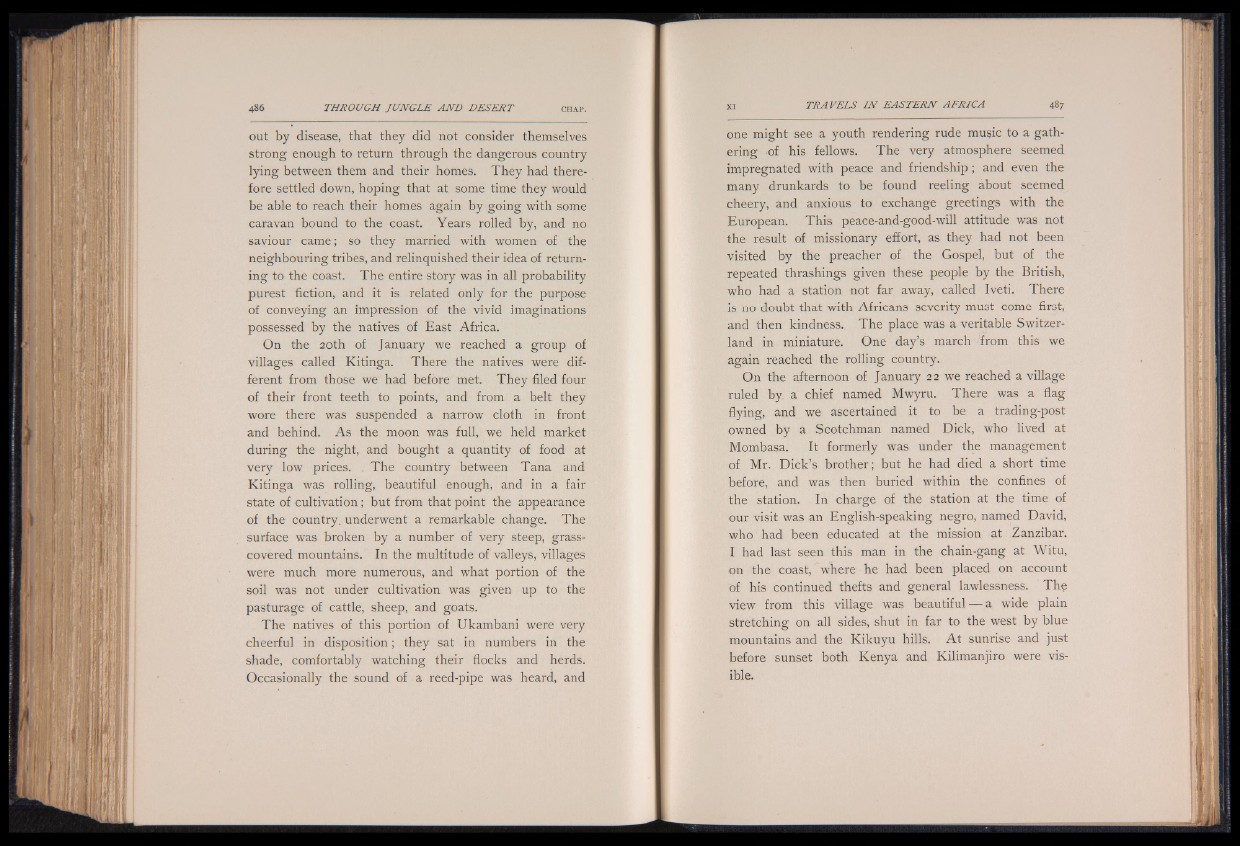
out by disease, that they did not consider themselves
strong enough to return through the dangerous country
lying between them and their homes. They had therefore
settled down, hoping that at some time they would
be able to reach their homes again by going with some
caravan bound to the coast. Years rolled by, and no
saviour came; so they married with women of the
neighbouring tribes, and relinquished their idea of returning
to the coast. The entire story was in all probability
purest fiction, and it is related only for the purpose
of conveying an impression of the vivid imaginations
possessed by the natives of East Africa.
On the 20th of January we reached a group of
villages called Kitinga. There the natives were different
from those we had before met. They filed four
of their front teeth to points, and from a belt they
wore there was suspended a narrow cloth in front
and behind. As the moon was full, we held market
during the night, and bought a quantity of food at
very low prices. . The country between Tana and
Kitinga was rolling, beautiful enough, and in a fair
state of cultivation; but from that point the appearance
of the country, underwent a remarkable change. The
surface was broken by a number of very steep, grass-
covered mountains. In the multitude of valleys, villages
were much more numerous, and what portion of the
soil was not under cultivation was given up to the
pasturage of cattle, sheep, and goats.
The natives of this portion of Ukambani were very
cheerful in disposition; they sat in numbers in the
shade, comfortably watching their flocks and herds.
Occasionally the sound of a reed-pipe was heard, and
one might see a youth rendering rude music to a gathering
of his fellows. The very atmosphere seemed
impregnated with peace and friendship; and even the
many drunkards to be found reeling about seemed
cheery, and anxious to exchange greetings with the
European. This peace-and-good-will attitude was not
the result of missionary effort, as they had not been
visited by the preacher of the Gospel, but of the
repeated thrashings given these people by the British,
who had a station not far away, called Iveti. There
is no doubt that with Africans severity must come first,
and then kindness.. The place was a veritable Switzerland
in miniature. One day’s march from this we
again reached the rolling country.
On the afternoon of January 22 we reached a village
ruled by, a chief named Mwyru. There was a flag
flying, and we ascertained it to be a trading-post
owned by a Scotchman named Dick, who lived at
Mombasa. It formerly was under the management
of Mr. Dick’s brother; but he had died a short time
before, and was then buried within the confines of
the station. In charge of the station at the time of
our visit was an English-speaking negro, named David,
who had been educated at the mission at Zanzibar.
I had last seen this man in the chain-gang at Witu,
on the coast, where he had been placed on account
of his continued thefts and general lawlessness. The
view from this village was beautiful — a wide plain
stretching on all sides, shut in far to the west by blue
mountains and the Kikuyu hills. A t sunrise and just
before sunset both Kenya and Kilimanjiro were visible.